Florin Luca's Entrepreneurship and Small Business Management Report
VerifiedAdded on 2022/10/11
|26
|7027
|11
Report
AI Summary
This report, submitted by Florin Luca for the Higher National Diploma in Business, Unit 09: Entrepreneurship and Small Business Management, covers key aspects of entrepreneurship. It begins by defining entrepreneurship and explores various entrepreneurial ventures like lifestyle ventures, social enterprises, female entrepreneurship, high-growth ventures, and small-scale entrepreneurship. The report then delves into the similarities and differences between these ventures, analyzing market share, scalability, and financial aspects. It also assesses the impact of micro and small businesses on the economy, highlighting their contribution to revenue generation and job creation. The report further examines the characteristics, traits, and skills of successful entrepreneurs, differentiating them from typical business managers. It explores how background and experience can influence entrepreneurship and concludes with a summary of the key findings.
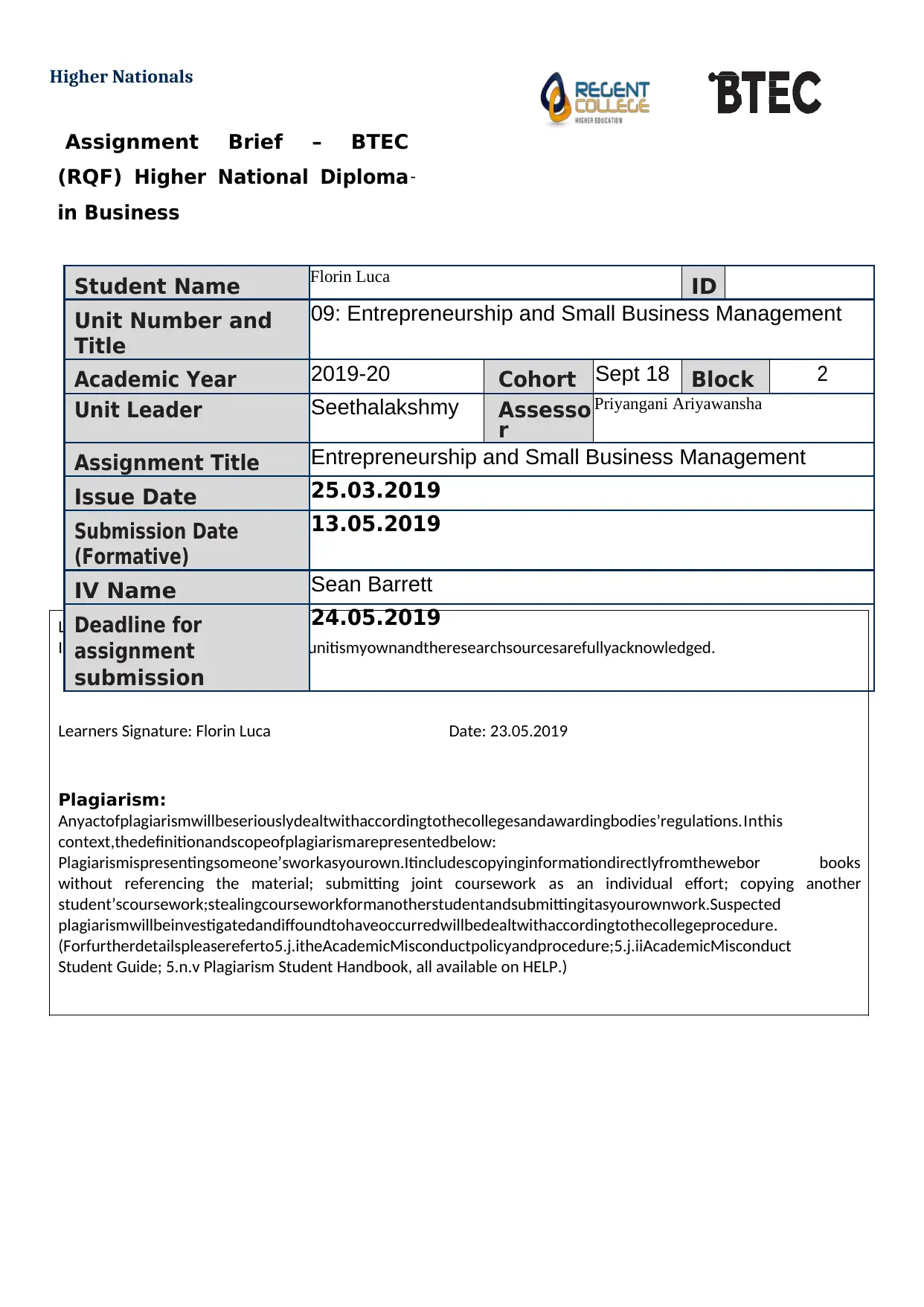
Plagiarism:
Anyactofplagiarismwillbeseriouslydealtwithaccordingtothecollegesandawardingbodies’regulations.Inthis
context,thedefinitionandscopeofplagiarismarepresentedbelow:
Plagiarismispresentingsomeone’sworkasyourown.Itincludescopyinginformationdirectlyfromthewebor books
without referencing the material; submitting joint coursework as an individual effort; copying another
student’scoursework;stealingcourseworkformanotherstudentandsubmittingitasyourownwork.Suspected
plagiarismwillbeinvestigatedandiffoundtohaveoccurredwillbedealtwithaccordingtothecollegeprocedure.
(Forfurtherdetailspleasereferto5.j.itheAcademicMisconductpolicyandprocedure;5.j.iiAcademicMisconduct
Student Guide; 5.n.v Plagiarism Student Handbook, all available on HELP.)
Date: 23.05.2019Learners Signature: Florin Luca
Learners Declaration:
Icertifythattheworksubmittedforthisunitismyownandtheresearchsourcesarefullyacknowledged.
Higher Nationals
Assignment Brief – BTEC
(RQF) Higher National Diploma
in Business
Student Name Florin Luca ID
Unit Number and
Title
09: Entrepreneurship and Small Business Management
Academic Year 2019-20 Cohort Sept 18 Block 2
Unit Leader Seethalakshmy Assesso
r
Priyangani Ariyawansha
Assignment Title Entrepreneurship and Small Business Management
Issue Date 25.03.2019
Submission Date
(Formative)
13.05.2019
IV Name Sean Barrett
Deadline for
assignment
submission
24.05.2019
Anyactofplagiarismwillbeseriouslydealtwithaccordingtothecollegesandawardingbodies’regulations.Inthis
context,thedefinitionandscopeofplagiarismarepresentedbelow:
Plagiarismispresentingsomeone’sworkasyourown.Itincludescopyinginformationdirectlyfromthewebor books
without referencing the material; submitting joint coursework as an individual effort; copying another
student’scoursework;stealingcourseworkformanotherstudentandsubmittingitasyourownwork.Suspected
plagiarismwillbeinvestigatedandiffoundtohaveoccurredwillbedealtwithaccordingtothecollegeprocedure.
(Forfurtherdetailspleasereferto5.j.itheAcademicMisconductpolicyandprocedure;5.j.iiAcademicMisconduct
Student Guide; 5.n.v Plagiarism Student Handbook, all available on HELP.)
Date: 23.05.2019Learners Signature: Florin Luca
Learners Declaration:
Icertifythattheworksubmittedforthisunitismyownandtheresearchsourcesarefullyacknowledged.
Higher Nationals
Assignment Brief – BTEC
(RQF) Higher National Diploma
in Business
Student Name Florin Luca ID
Unit Number and
Title
09: Entrepreneurship and Small Business Management
Academic Year 2019-20 Cohort Sept 18 Block 2
Unit Leader Seethalakshmy Assesso
r
Priyangani Ariyawansha
Assignment Title Entrepreneurship and Small Business Management
Issue Date 25.03.2019
Submission Date
(Formative)
13.05.2019
IV Name Sean Barrett
Deadline for
assignment
submission
24.05.2019
Paraphrase This Document
Need a fresh take? Get an instant paraphrase of this document with our AI Paraphraser
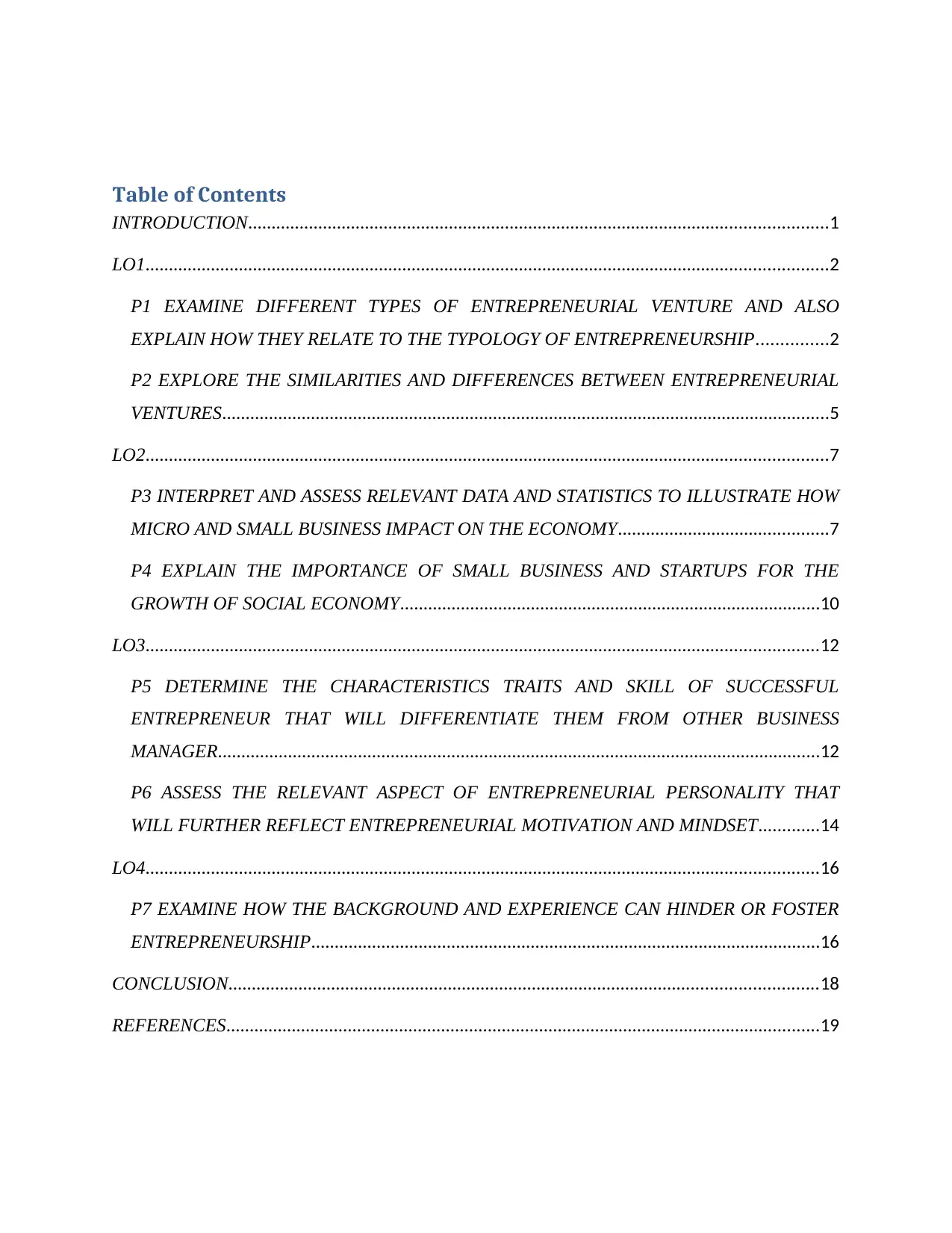
Table of Contents
INTRODUCTION............................................................................................................................1
LO1..................................................................................................................................................2
P1 EXAMINE DIFFERENT TYPES OF ENTREPRENEURIAL VENTURE AND ALSO
EXPLAIN HOW THEY RELATE TO THE TYPOLOGY OF ENTREPRENEURSHIP...............2
P2 EXPLORE THE SIMILARITIES AND DIFFERENCES BETWEEN ENTREPRENEURIAL
VENTURES..................................................................................................................................5
LO2..................................................................................................................................................7
P3 INTERPRET AND ASSESS RELEVANT DATA AND STATISTICS TO ILLUSTRATE HOW
MICRO AND SMALL BUSINESS IMPACT ON THE ECONOMY.............................................7
P4 EXPLAIN THE IMPORTANCE OF SMALL BUSINESS AND STARTUPS FOR THE
GROWTH OF SOCIAL ECONOMY..........................................................................................10
LO3................................................................................................................................................12
P5 DETERMINE THE CHARACTERISTICS TRAITS AND SKILL OF SUCCESSFUL
ENTREPRENEUR THAT WILL DIFFERENTIATE THEM FROM OTHER BUSINESS
MANAGER.................................................................................................................................12
P6 ASSESS THE RELEVANT ASPECT OF ENTREPRENEURIAL PERSONALITY THAT
WILL FURTHER REFLECT ENTREPRENEURIAL MOTIVATION AND MINDSET.............14
LO4................................................................................................................................................16
P7 EXAMINE HOW THE BACKGROUND AND EXPERIENCE CAN HINDER OR FOSTER
ENTREPRENEURSHIP.............................................................................................................16
CONCLUSION..............................................................................................................................18
REFERENCES...............................................................................................................................19
INTRODUCTION............................................................................................................................1
LO1..................................................................................................................................................2
P1 EXAMINE DIFFERENT TYPES OF ENTREPRENEURIAL VENTURE AND ALSO
EXPLAIN HOW THEY RELATE TO THE TYPOLOGY OF ENTREPRENEURSHIP...............2
P2 EXPLORE THE SIMILARITIES AND DIFFERENCES BETWEEN ENTREPRENEURIAL
VENTURES..................................................................................................................................5
LO2..................................................................................................................................................7
P3 INTERPRET AND ASSESS RELEVANT DATA AND STATISTICS TO ILLUSTRATE HOW
MICRO AND SMALL BUSINESS IMPACT ON THE ECONOMY.............................................7
P4 EXPLAIN THE IMPORTANCE OF SMALL BUSINESS AND STARTUPS FOR THE
GROWTH OF SOCIAL ECONOMY..........................................................................................10
LO3................................................................................................................................................12
P5 DETERMINE THE CHARACTERISTICS TRAITS AND SKILL OF SUCCESSFUL
ENTREPRENEUR THAT WILL DIFFERENTIATE THEM FROM OTHER BUSINESS
MANAGER.................................................................................................................................12
P6 ASSESS THE RELEVANT ASPECT OF ENTREPRENEURIAL PERSONALITY THAT
WILL FURTHER REFLECT ENTREPRENEURIAL MOTIVATION AND MINDSET.............14
LO4................................................................................................................................................16
P7 EXAMINE HOW THE BACKGROUND AND EXPERIENCE CAN HINDER OR FOSTER
ENTREPRENEURSHIP.............................................................................................................16
CONCLUSION..............................................................................................................................18
REFERENCES...............................................................................................................................19
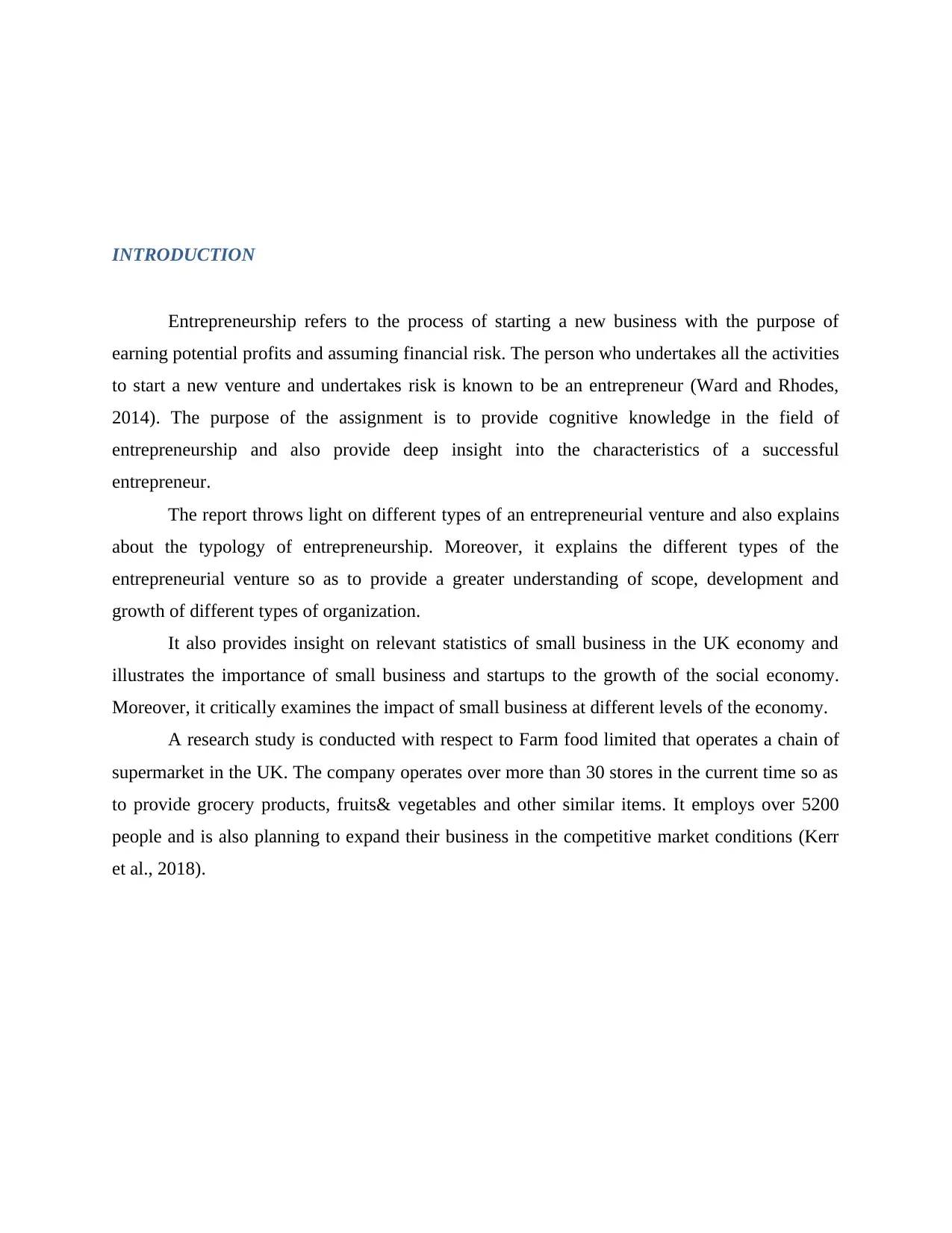
INTRODUCTION
Entrepreneurship refers to the process of starting a new business with the purpose of
earning potential profits and assuming financial risk. The person who undertakes all the activities
to start a new venture and undertakes risk is known to be an entrepreneur (Ward and Rhodes,
2014). The purpose of the assignment is to provide cognitive knowledge in the field of
entrepreneurship and also provide deep insight into the characteristics of a successful
entrepreneur.
The report throws light on different types of an entrepreneurial venture and also explains
about the typology of entrepreneurship. Moreover, it explains the different types of the
entrepreneurial venture so as to provide a greater understanding of scope, development and
growth of different types of organization.
It also provides insight on relevant statistics of small business in the UK economy and
illustrates the importance of small business and startups to the growth of the social economy.
Moreover, it critically examines the impact of small business at different levels of the economy.
A research study is conducted with respect to Farm food limited that operates a chain of
supermarket in the UK. The company operates over more than 30 stores in the current time so as
to provide grocery products, fruits& vegetables and other similar items. It employs over 5200
people and is also planning to expand their business in the competitive market conditions (Kerr
et al., 2018).
Entrepreneurship refers to the process of starting a new business with the purpose of
earning potential profits and assuming financial risk. The person who undertakes all the activities
to start a new venture and undertakes risk is known to be an entrepreneur (Ward and Rhodes,
2014). The purpose of the assignment is to provide cognitive knowledge in the field of
entrepreneurship and also provide deep insight into the characteristics of a successful
entrepreneur.
The report throws light on different types of an entrepreneurial venture and also explains
about the typology of entrepreneurship. Moreover, it explains the different types of the
entrepreneurial venture so as to provide a greater understanding of scope, development and
growth of different types of organization.
It also provides insight on relevant statistics of small business in the UK economy and
illustrates the importance of small business and startups to the growth of the social economy.
Moreover, it critically examines the impact of small business at different levels of the economy.
A research study is conducted with respect to Farm food limited that operates a chain of
supermarket in the UK. The company operates over more than 30 stores in the current time so as
to provide grocery products, fruits& vegetables and other similar items. It employs over 5200
people and is also planning to expand their business in the competitive market conditions (Kerr
et al., 2018).
⊘ This is a preview!⊘
Do you want full access?
Subscribe today to unlock all pages.

Trusted by 1+ million students worldwide
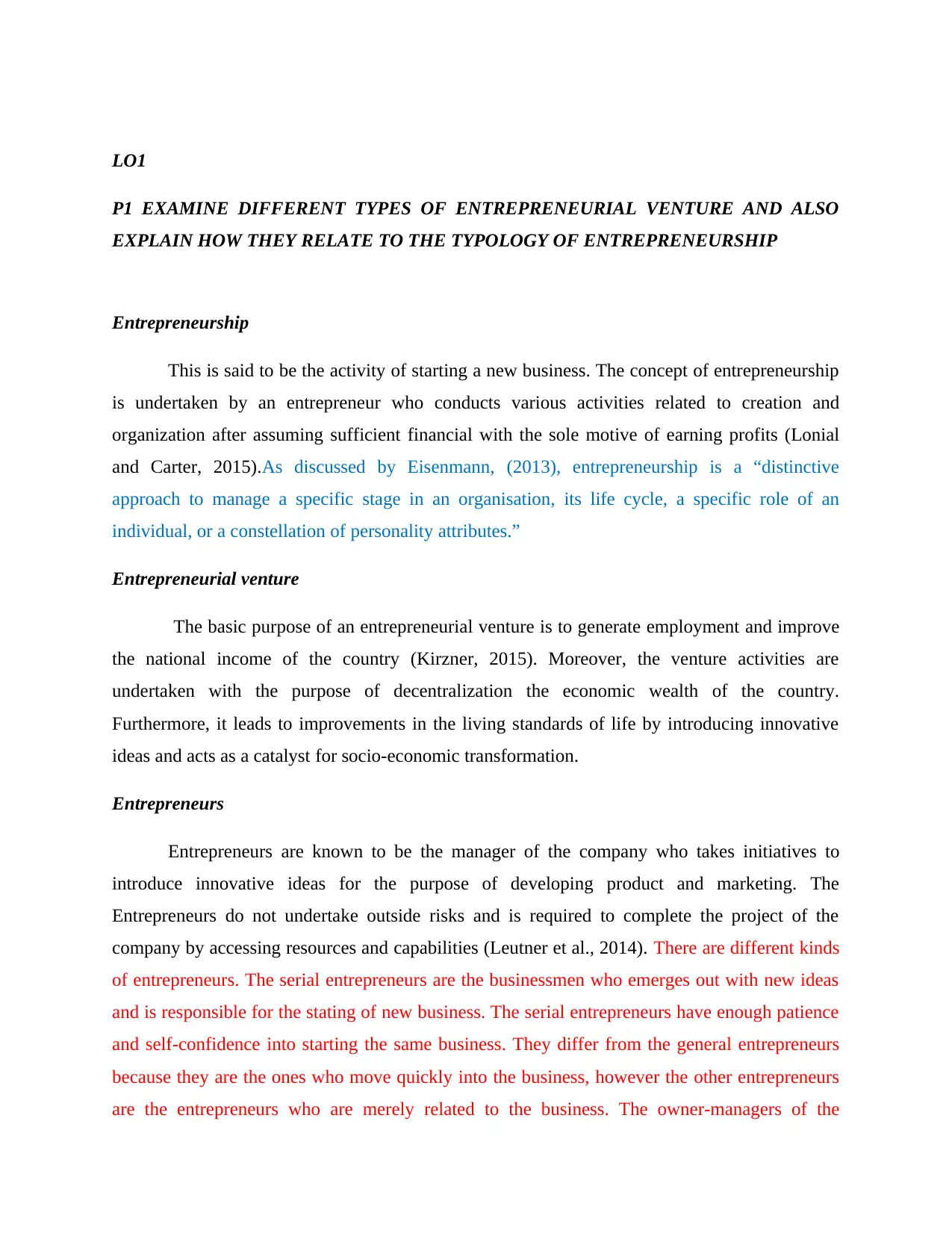
LO1
P1 EXAMINE DIFFERENT TYPES OF ENTREPRENEURIAL VENTURE AND ALSO
EXPLAIN HOW THEY RELATE TO THE TYPOLOGY OF ENTREPRENEURSHIP
Entrepreneurship
This is said to be the activity of starting a new business. The concept of entrepreneurship
is undertaken by an entrepreneur who conducts various activities related to creation and
organization after assuming sufficient financial with the sole motive of earning profits (Lonial
and Carter, 2015).As discussed by Eisenmann, (2013), entrepreneurship is a “distinctive
approach to manage a specific stage in an organisation, its life cycle, a specific role of an
individual, or a constellation of personality attributes.”
Entrepreneurial venture
The basic purpose of an entrepreneurial venture is to generate employment and improve
the national income of the country (Kirzner, 2015). Moreover, the venture activities are
undertaken with the purpose of decentralization the economic wealth of the country.
Furthermore, it leads to improvements in the living standards of life by introducing innovative
ideas and acts as a catalyst for socio-economic transformation.
Entrepreneurs
Entrepreneurs are known to be the manager of the company who takes initiatives to
introduce innovative ideas for the purpose of developing product and marketing. The
Entrepreneurs do not undertake outside risks and is required to complete the project of the
company by accessing resources and capabilities (Leutner et al., 2014). There are different kinds
of entrepreneurs. The serial entrepreneurs are the businessmen who emerges out with new ideas
and is responsible for the stating of new business. The serial entrepreneurs have enough patience
and self-confidence into starting the same business. They differ from the general entrepreneurs
because they are the ones who move quickly into the business, however the other entrepreneurs
are the entrepreneurs who are merely related to the business. The owner-managers of the
P1 EXAMINE DIFFERENT TYPES OF ENTREPRENEURIAL VENTURE AND ALSO
EXPLAIN HOW THEY RELATE TO THE TYPOLOGY OF ENTREPRENEURSHIP
Entrepreneurship
This is said to be the activity of starting a new business. The concept of entrepreneurship
is undertaken by an entrepreneur who conducts various activities related to creation and
organization after assuming sufficient financial with the sole motive of earning profits (Lonial
and Carter, 2015).As discussed by Eisenmann, (2013), entrepreneurship is a “distinctive
approach to manage a specific stage in an organisation, its life cycle, a specific role of an
individual, or a constellation of personality attributes.”
Entrepreneurial venture
The basic purpose of an entrepreneurial venture is to generate employment and improve
the national income of the country (Kirzner, 2015). Moreover, the venture activities are
undertaken with the purpose of decentralization the economic wealth of the country.
Furthermore, it leads to improvements in the living standards of life by introducing innovative
ideas and acts as a catalyst for socio-economic transformation.
Entrepreneurs
Entrepreneurs are known to be the manager of the company who takes initiatives to
introduce innovative ideas for the purpose of developing product and marketing. The
Entrepreneurs do not undertake outside risks and is required to complete the project of the
company by accessing resources and capabilities (Leutner et al., 2014). There are different kinds
of entrepreneurs. The serial entrepreneurs are the businessmen who emerges out with new ideas
and is responsible for the stating of new business. The serial entrepreneurs have enough patience
and self-confidence into starting the same business. They differ from the general entrepreneurs
because they are the ones who move quickly into the business, however the other entrepreneurs
are the entrepreneurs who are merely related to the business. The owner-managers of the
Paraphrase This Document
Need a fresh take? Get an instant paraphrase of this document with our AI Paraphraser
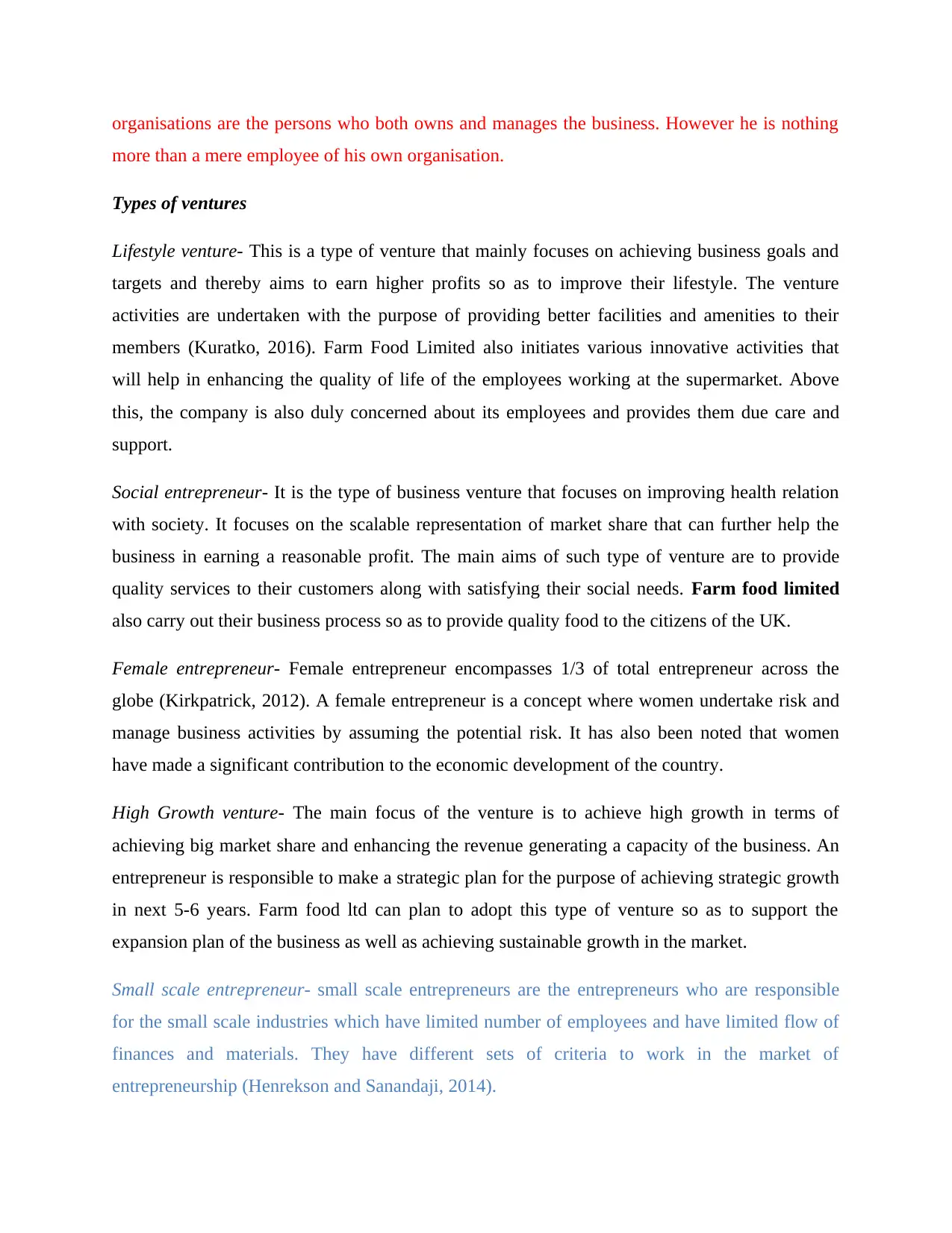
organisations are the persons who both owns and manages the business. However he is nothing
more than a mere employee of his own organisation.
Types of ventures
Lifestyle venture- This is a type of venture that mainly focuses on achieving business goals and
targets and thereby aims to earn higher profits so as to improve their lifestyle. The venture
activities are undertaken with the purpose of providing better facilities and amenities to their
members (Kuratko, 2016). Farm Food Limited also initiates various innovative activities that
will help in enhancing the quality of life of the employees working at the supermarket. Above
this, the company is also duly concerned about its employees and provides them due care and
support.
Social entrepreneur- It is the type of business venture that focuses on improving health relation
with society. It focuses on the scalable representation of market share that can further help the
business in earning a reasonable profit. The main aims of such type of venture are to provide
quality services to their customers along with satisfying their social needs. Farm food limited
also carry out their business process so as to provide quality food to the citizens of the UK.
Female entrepreneur- Female entrepreneur encompasses 1/3 of total entrepreneur across the
globe (Kirkpatrick, 2012). A female entrepreneur is a concept where women undertake risk and
manage business activities by assuming the potential risk. It has also been noted that women
have made a significant contribution to the economic development of the country.
High Growth venture- The main focus of the venture is to achieve high growth in terms of
achieving big market share and enhancing the revenue generating a capacity of the business. An
entrepreneur is responsible to make a strategic plan for the purpose of achieving strategic growth
in next 5-6 years. Farm food ltd can plan to adopt this type of venture so as to support the
expansion plan of the business as well as achieving sustainable growth in the market.
Small scale entrepreneur- small scale entrepreneurs are the entrepreneurs who are responsible
for the small scale industries which have limited number of employees and have limited flow of
finances and materials. They have different sets of criteria to work in the market of
entrepreneurship (Henrekson and Sanandaji, 2014).
more than a mere employee of his own organisation.
Types of ventures
Lifestyle venture- This is a type of venture that mainly focuses on achieving business goals and
targets and thereby aims to earn higher profits so as to improve their lifestyle. The venture
activities are undertaken with the purpose of providing better facilities and amenities to their
members (Kuratko, 2016). Farm Food Limited also initiates various innovative activities that
will help in enhancing the quality of life of the employees working at the supermarket. Above
this, the company is also duly concerned about its employees and provides them due care and
support.
Social entrepreneur- It is the type of business venture that focuses on improving health relation
with society. It focuses on the scalable representation of market share that can further help the
business in earning a reasonable profit. The main aims of such type of venture are to provide
quality services to their customers along with satisfying their social needs. Farm food limited
also carry out their business process so as to provide quality food to the citizens of the UK.
Female entrepreneur- Female entrepreneur encompasses 1/3 of total entrepreneur across the
globe (Kirkpatrick, 2012). A female entrepreneur is a concept where women undertake risk and
manage business activities by assuming the potential risk. It has also been noted that women
have made a significant contribution to the economic development of the country.
High Growth venture- The main focus of the venture is to achieve high growth in terms of
achieving big market share and enhancing the revenue generating a capacity of the business. An
entrepreneur is responsible to make a strategic plan for the purpose of achieving strategic growth
in next 5-6 years. Farm food ltd can plan to adopt this type of venture so as to support the
expansion plan of the business as well as achieving sustainable growth in the market.
Small scale entrepreneur- small scale entrepreneurs are the entrepreneurs who are responsible
for the small scale industries which have limited number of employees and have limited flow of
finances and materials. They have different sets of criteria to work in the market of
entrepreneurship (Henrekson and Sanandaji, 2014).
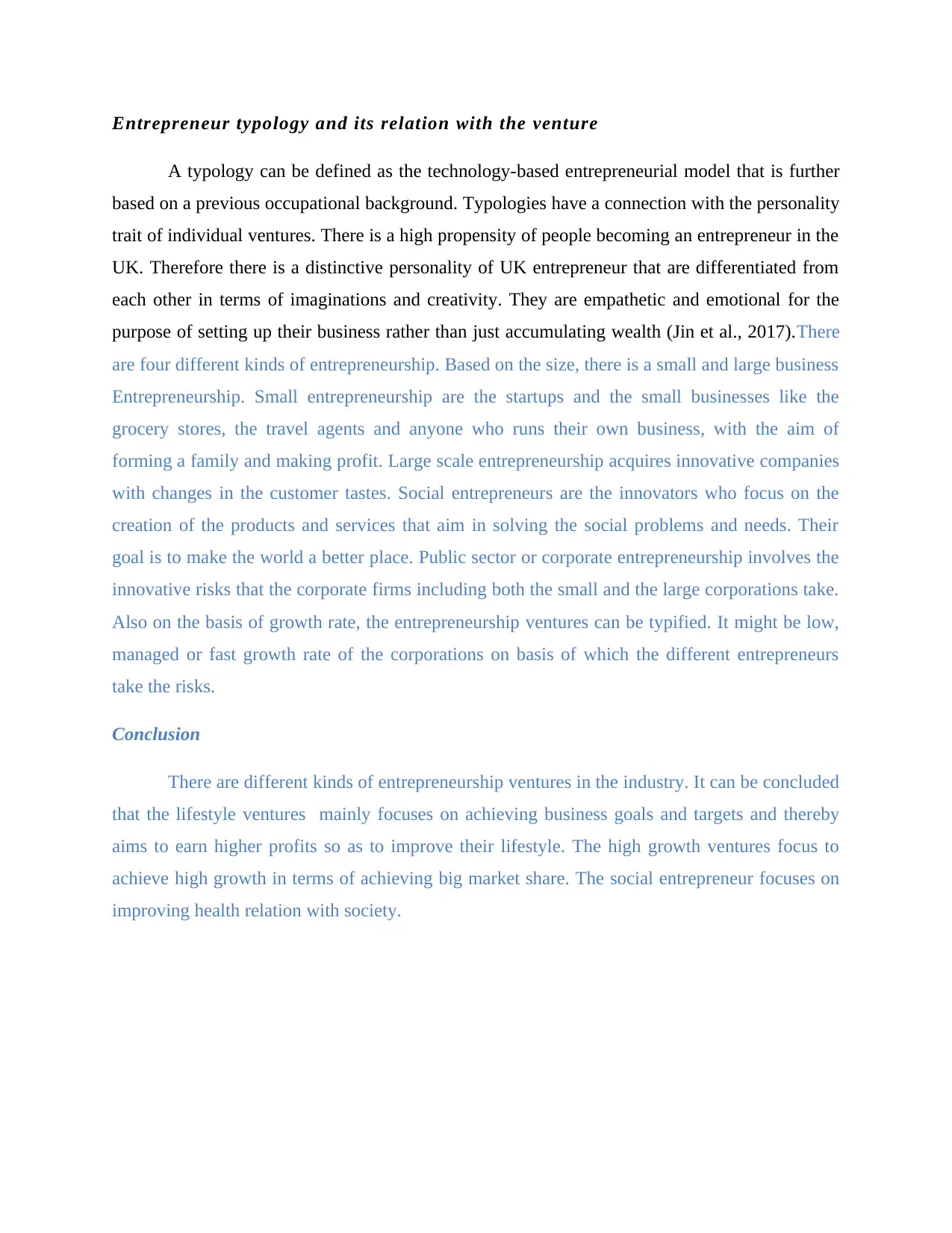
Entrepreneur typology and its relation with the venture
A typology can be defined as the technology-based entrepreneurial model that is further
based on a previous occupational background. Typologies have a connection with the personality
trait of individual ventures. There is a high propensity of people becoming an entrepreneur in the
UK. Therefore there is a distinctive personality of UK entrepreneur that are differentiated from
each other in terms of imaginations and creativity. They are empathetic and emotional for the
purpose of setting up their business rather than just accumulating wealth (Jin et al., 2017).There
are four different kinds of entrepreneurship. Based on the size, there is a small and large business
Entrepreneurship. Small entrepreneurship are the startups and the small businesses like the
grocery stores, the travel agents and anyone who runs their own business, with the aim of
forming a family and making profit. Large scale entrepreneurship acquires innovative companies
with changes in the customer tastes. Social entrepreneurs are the innovators who focus on the
creation of the products and services that aim in solving the social problems and needs. Their
goal is to make the world a better place. Public sector or corporate entrepreneurship involves the
innovative risks that the corporate firms including both the small and the large corporations take.
Also on the basis of growth rate, the entrepreneurship ventures can be typified. It might be low,
managed or fast growth rate of the corporations on basis of which the different entrepreneurs
take the risks.
Conclusion
There are different kinds of entrepreneurship ventures in the industry. It can be concluded
that the lifestyle ventures mainly focuses on achieving business goals and targets and thereby
aims to earn higher profits so as to improve their lifestyle. The high growth ventures focus to
achieve high growth in terms of achieving big market share. The social entrepreneur focuses on
improving health relation with society.
A typology can be defined as the technology-based entrepreneurial model that is further
based on a previous occupational background. Typologies have a connection with the personality
trait of individual ventures. There is a high propensity of people becoming an entrepreneur in the
UK. Therefore there is a distinctive personality of UK entrepreneur that are differentiated from
each other in terms of imaginations and creativity. They are empathetic and emotional for the
purpose of setting up their business rather than just accumulating wealth (Jin et al., 2017).There
are four different kinds of entrepreneurship. Based on the size, there is a small and large business
Entrepreneurship. Small entrepreneurship are the startups and the small businesses like the
grocery stores, the travel agents and anyone who runs their own business, with the aim of
forming a family and making profit. Large scale entrepreneurship acquires innovative companies
with changes in the customer tastes. Social entrepreneurs are the innovators who focus on the
creation of the products and services that aim in solving the social problems and needs. Their
goal is to make the world a better place. Public sector or corporate entrepreneurship involves the
innovative risks that the corporate firms including both the small and the large corporations take.
Also on the basis of growth rate, the entrepreneurship ventures can be typified. It might be low,
managed or fast growth rate of the corporations on basis of which the different entrepreneurs
take the risks.
Conclusion
There are different kinds of entrepreneurship ventures in the industry. It can be concluded
that the lifestyle ventures mainly focuses on achieving business goals and targets and thereby
aims to earn higher profits so as to improve their lifestyle. The high growth ventures focus to
achieve high growth in terms of achieving big market share. The social entrepreneur focuses on
improving health relation with society.
⊘ This is a preview!⊘
Do you want full access?
Subscribe today to unlock all pages.

Trusted by 1+ million students worldwide
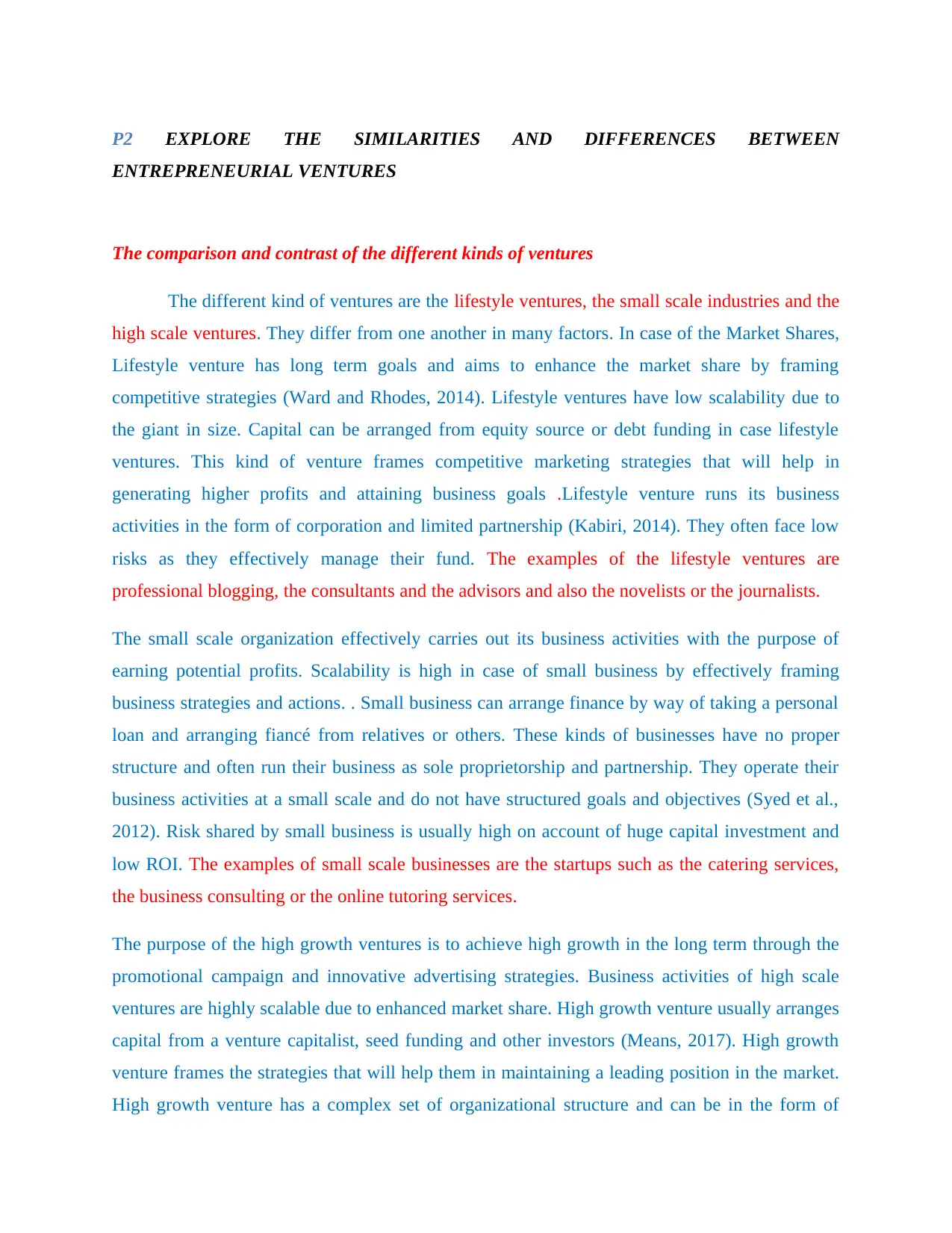
P2 EXPLORE THE SIMILARITIES AND DIFFERENCES BETWEEN
ENTREPRENEURIAL VENTURES
The comparison and contrast of the different kinds of ventures
The different kind of ventures are the lifestyle ventures, the small scale industries and the
high scale ventures. They differ from one another in many factors. In case of the Market Shares,
Lifestyle venture has long term goals and aims to enhance the market share by framing
competitive strategies (Ward and Rhodes, 2014). Lifestyle ventures have low scalability due to
the giant in size. Capital can be arranged from equity source or debt funding in case lifestyle
ventures. This kind of venture frames competitive marketing strategies that will help in
generating higher profits and attaining business goals .Lifestyle venture runs its business
activities in the form of corporation and limited partnership (Kabiri, 2014). They often face low
risks as they effectively manage their fund. The examples of the lifestyle ventures are
professional blogging, the consultants and the advisors and also the novelists or the journalists.
The small scale organization effectively carries out its business activities with the purpose of
earning potential profits. Scalability is high in case of small business by effectively framing
business strategies and actions. . Small business can arrange finance by way of taking a personal
loan and arranging fiancé from relatives or others. These kinds of businesses have no proper
structure and often run their business as sole proprietorship and partnership. They operate their
business activities at a small scale and do not have structured goals and objectives (Syed et al.,
2012). Risk shared by small business is usually high on account of huge capital investment and
low ROI. The examples of small scale businesses are the startups such as the catering services,
the business consulting or the online tutoring services.
The purpose of the high growth ventures is to achieve high growth in the long term through the
promotional campaign and innovative advertising strategies. Business activities of high scale
ventures are highly scalable due to enhanced market share. High growth venture usually arranges
capital from a venture capitalist, seed funding and other investors (Means, 2017). High growth
venture frames the strategies that will help them in maintaining a leading position in the market.
High growth venture has a complex set of organizational structure and can be in the form of
ENTREPRENEURIAL VENTURES
The comparison and contrast of the different kinds of ventures
The different kind of ventures are the lifestyle ventures, the small scale industries and the
high scale ventures. They differ from one another in many factors. In case of the Market Shares,
Lifestyle venture has long term goals and aims to enhance the market share by framing
competitive strategies (Ward and Rhodes, 2014). Lifestyle ventures have low scalability due to
the giant in size. Capital can be arranged from equity source or debt funding in case lifestyle
ventures. This kind of venture frames competitive marketing strategies that will help in
generating higher profits and attaining business goals .Lifestyle venture runs its business
activities in the form of corporation and limited partnership (Kabiri, 2014). They often face low
risks as they effectively manage their fund. The examples of the lifestyle ventures are
professional blogging, the consultants and the advisors and also the novelists or the journalists.
The small scale organization effectively carries out its business activities with the purpose of
earning potential profits. Scalability is high in case of small business by effectively framing
business strategies and actions. . Small business can arrange finance by way of taking a personal
loan and arranging fiancé from relatives or others. These kinds of businesses have no proper
structure and often run their business as sole proprietorship and partnership. They operate their
business activities at a small scale and do not have structured goals and objectives (Syed et al.,
2012). Risk shared by small business is usually high on account of huge capital investment and
low ROI. The examples of small scale businesses are the startups such as the catering services,
the business consulting or the online tutoring services.
The purpose of the high growth ventures is to achieve high growth in the long term through the
promotional campaign and innovative advertising strategies. Business activities of high scale
ventures are highly scalable due to enhanced market share. High growth venture usually arranges
capital from a venture capitalist, seed funding and other investors (Means, 2017). High growth
venture frames the strategies that will help them in maintaining a leading position in the market.
High growth venture has a complex set of organizational structure and can be in the form of
Paraphrase This Document
Need a fresh take? Get an instant paraphrase of this document with our AI Paraphraser
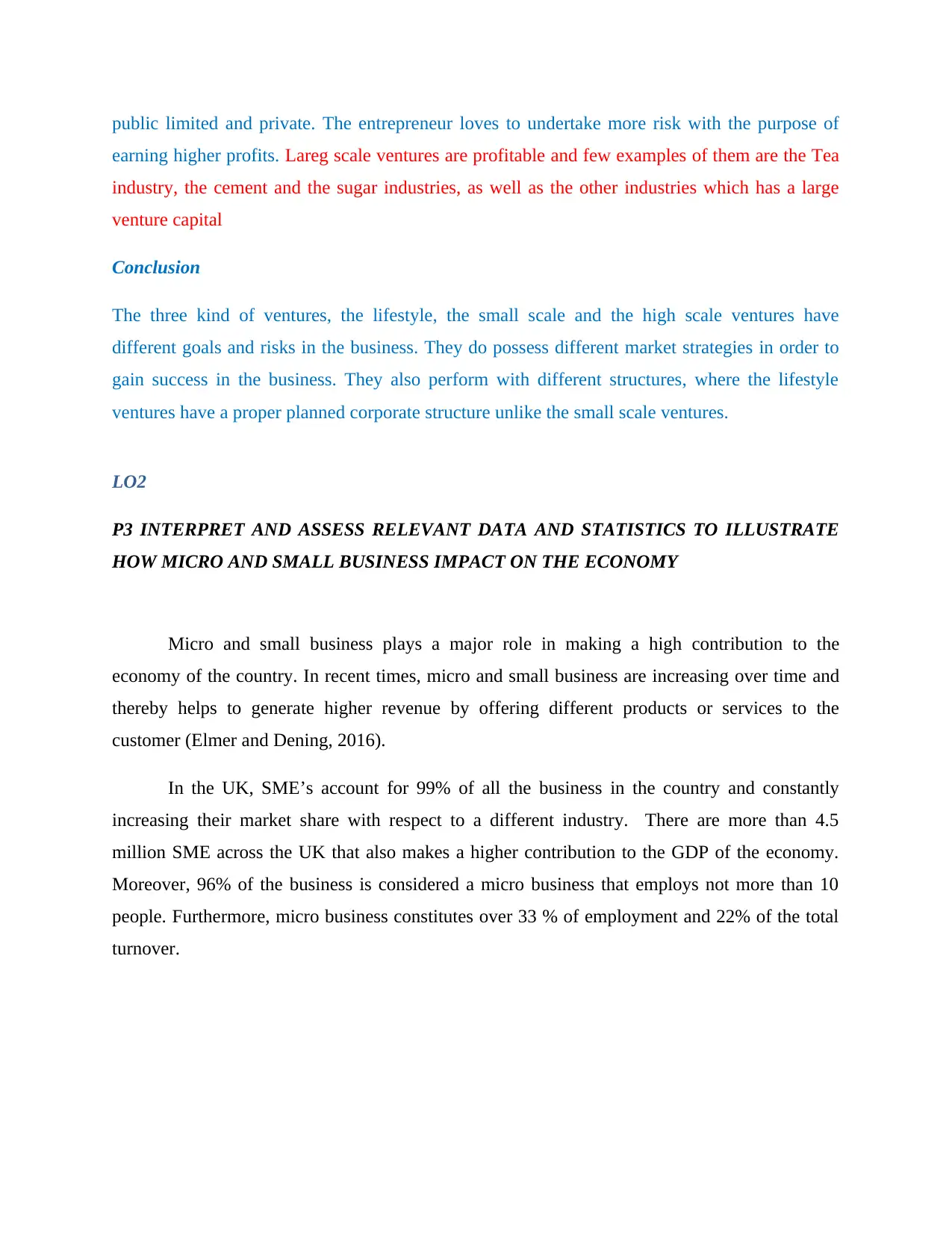
public limited and private. The entrepreneur loves to undertake more risk with the purpose of
earning higher profits. Lareg scale ventures are profitable and few examples of them are the Tea
industry, the cement and the sugar industries, as well as the other industries which has a large
venture capital
Conclusion
The three kind of ventures, the lifestyle, the small scale and the high scale ventures have
different goals and risks in the business. They do possess different market strategies in order to
gain success in the business. They also perform with different structures, where the lifestyle
ventures have a proper planned corporate structure unlike the small scale ventures.
LO2
P3 INTERPRET AND ASSESS RELEVANT DATA AND STATISTICS TO ILLUSTRATE
HOW MICRO AND SMALL BUSINESS IMPACT ON THE ECONOMY
Micro and small business plays a major role in making a high contribution to the
economy of the country. In recent times, micro and small business are increasing over time and
thereby helps to generate higher revenue by offering different products or services to the
customer (Elmer and Dening, 2016).
In the UK, SME’s account for 99% of all the business in the country and constantly
increasing their market share with respect to a different industry. There are more than 4.5
million SME across the UK that also makes a higher contribution to the GDP of the economy.
Moreover, 96% of the business is considered a micro business that employs not more than 10
people. Furthermore, micro business constitutes over 33 % of employment and 22% of the total
turnover.
earning higher profits. Lareg scale ventures are profitable and few examples of them are the Tea
industry, the cement and the sugar industries, as well as the other industries which has a large
venture capital
Conclusion
The three kind of ventures, the lifestyle, the small scale and the high scale ventures have
different goals and risks in the business. They do possess different market strategies in order to
gain success in the business. They also perform with different structures, where the lifestyle
ventures have a proper planned corporate structure unlike the small scale ventures.
LO2
P3 INTERPRET AND ASSESS RELEVANT DATA AND STATISTICS TO ILLUSTRATE
HOW MICRO AND SMALL BUSINESS IMPACT ON THE ECONOMY
Micro and small business plays a major role in making a high contribution to the
economy of the country. In recent times, micro and small business are increasing over time and
thereby helps to generate higher revenue by offering different products or services to the
customer (Elmer and Dening, 2016).
In the UK, SME’s account for 99% of all the business in the country and constantly
increasing their market share with respect to a different industry. There are more than 4.5
million SME across the UK that also makes a higher contribution to the GDP of the economy.
Moreover, 96% of the business is considered a micro business that employs not more than 10
people. Furthermore, micro business constitutes over 33 % of employment and 22% of the total
turnover.
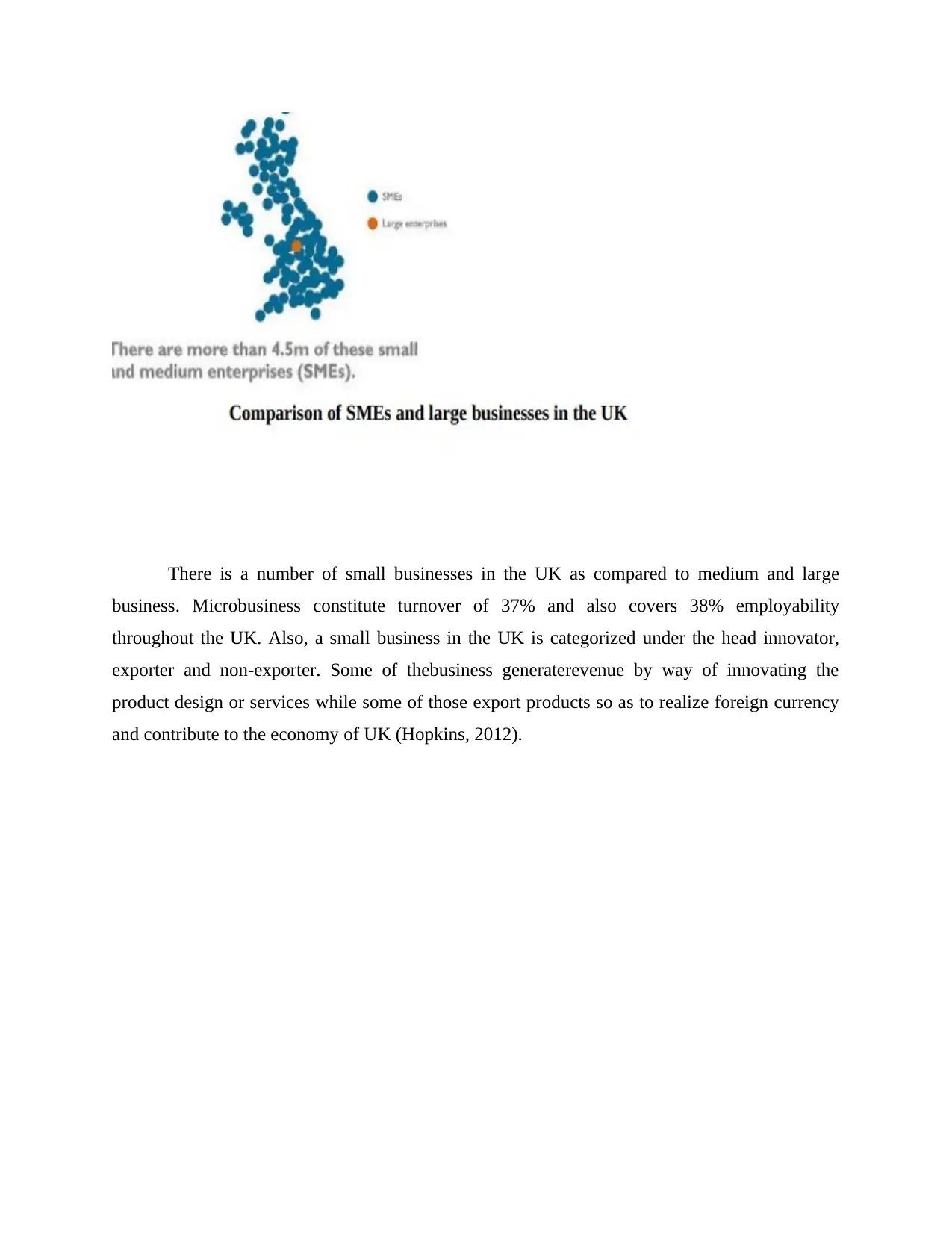
There is a number of small businesses in the UK as compared to medium and large
business. Microbusiness constitute turnover of 37% and also covers 38% employability
throughout the UK. Also, a small business in the UK is categorized under the head innovator,
exporter and non-exporter. Some of thebusiness generaterevenue by way of innovating the
product design or services while some of those export products so as to realize foreign currency
and contribute to the economy of UK (Hopkins, 2012).
business. Microbusiness constitute turnover of 37% and also covers 38% employability
throughout the UK. Also, a small business in the UK is categorized under the head innovator,
exporter and non-exporter. Some of thebusiness generaterevenue by way of innovating the
product design or services while some of those export products so as to realize foreign currency
and contribute to the economy of UK (Hopkins, 2012).
⊘ This is a preview!⊘
Do you want full access?
Subscribe today to unlock all pages.

Trusted by 1+ million students worldwide
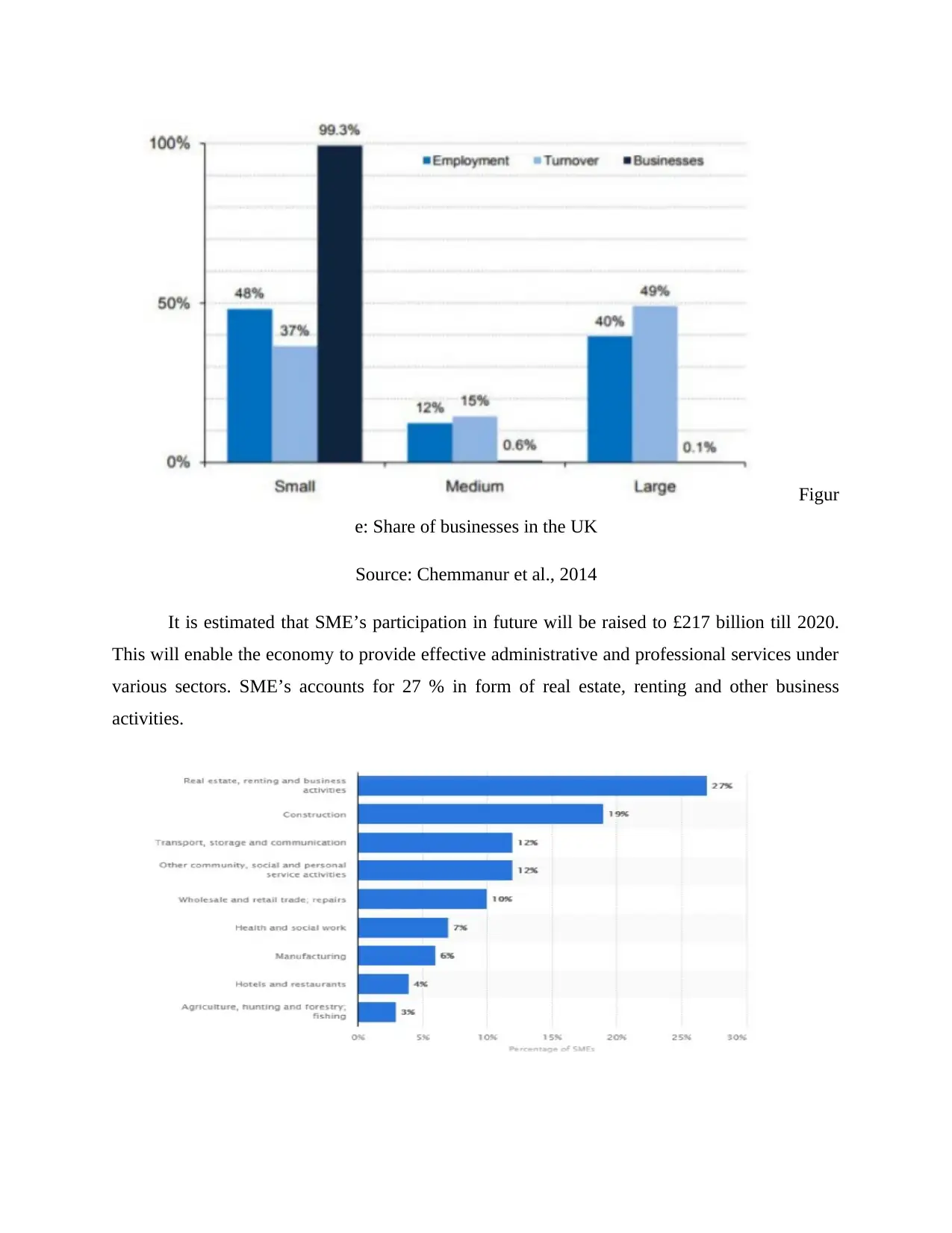
Figur
e: Share of businesses in the UK
Source: Chemmanur et al., 2014
It is estimated that SME’s participation in future will be raised to £217 billion till 2020.
This will enable the economy to provide effective administrative and professional services under
various sectors. SME’s accounts for 27 % in form of real estate, renting and other business
activities.
e: Share of businesses in the UK
Source: Chemmanur et al., 2014
It is estimated that SME’s participation in future will be raised to £217 billion till 2020.
This will enable the economy to provide effective administrative and professional services under
various sectors. SME’s accounts for 27 % in form of real estate, renting and other business
activities.
Paraphrase This Document
Need a fresh take? Get an instant paraphrase of this document with our AI Paraphraser
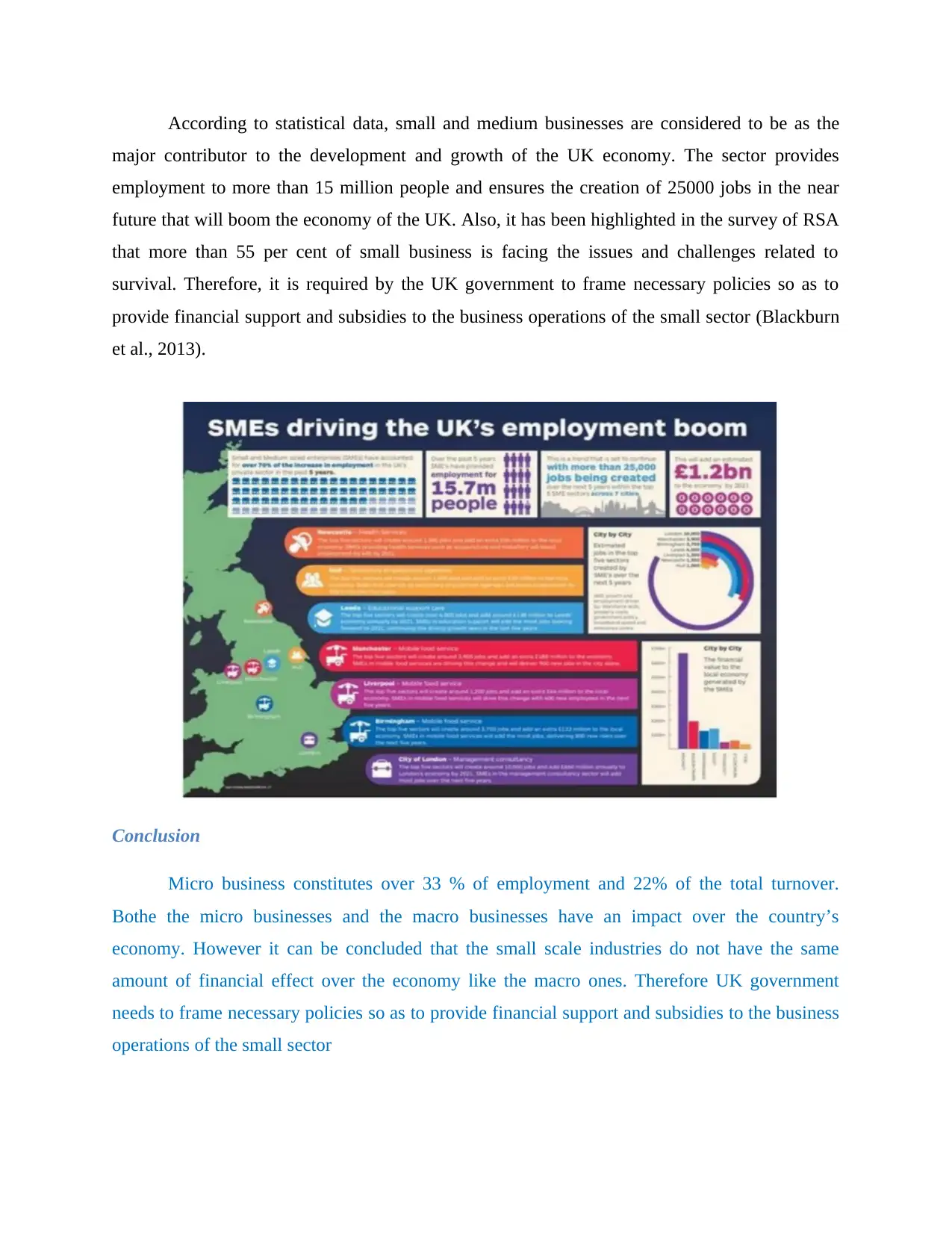
According to statistical data, small and medium businesses are considered to be as the
major contributor to the development and growth of the UK economy. The sector provides
employment to more than 15 million people and ensures the creation of 25000 jobs in the near
future that will boom the economy of the UK. Also, it has been highlighted in the survey of RSA
that more than 55 per cent of small business is facing the issues and challenges related to
survival. Therefore, it is required by the UK government to frame necessary policies so as to
provide financial support and subsidies to the business operations of the small sector (Blackburn
et al., 2013).
Conclusion
Micro business constitutes over 33 % of employment and 22% of the total turnover.
Bothe the micro businesses and the macro businesses have an impact over the country’s
economy. However it can be concluded that the small scale industries do not have the same
amount of financial effect over the economy like the macro ones. Therefore UK government
needs to frame necessary policies so as to provide financial support and subsidies to the business
operations of the small sector
major contributor to the development and growth of the UK economy. The sector provides
employment to more than 15 million people and ensures the creation of 25000 jobs in the near
future that will boom the economy of the UK. Also, it has been highlighted in the survey of RSA
that more than 55 per cent of small business is facing the issues and challenges related to
survival. Therefore, it is required by the UK government to frame necessary policies so as to
provide financial support and subsidies to the business operations of the small sector (Blackburn
et al., 2013).
Conclusion
Micro business constitutes over 33 % of employment and 22% of the total turnover.
Bothe the micro businesses and the macro businesses have an impact over the country’s
economy. However it can be concluded that the small scale industries do not have the same
amount of financial effect over the economy like the macro ones. Therefore UK government
needs to frame necessary policies so as to provide financial support and subsidies to the business
operations of the small sector
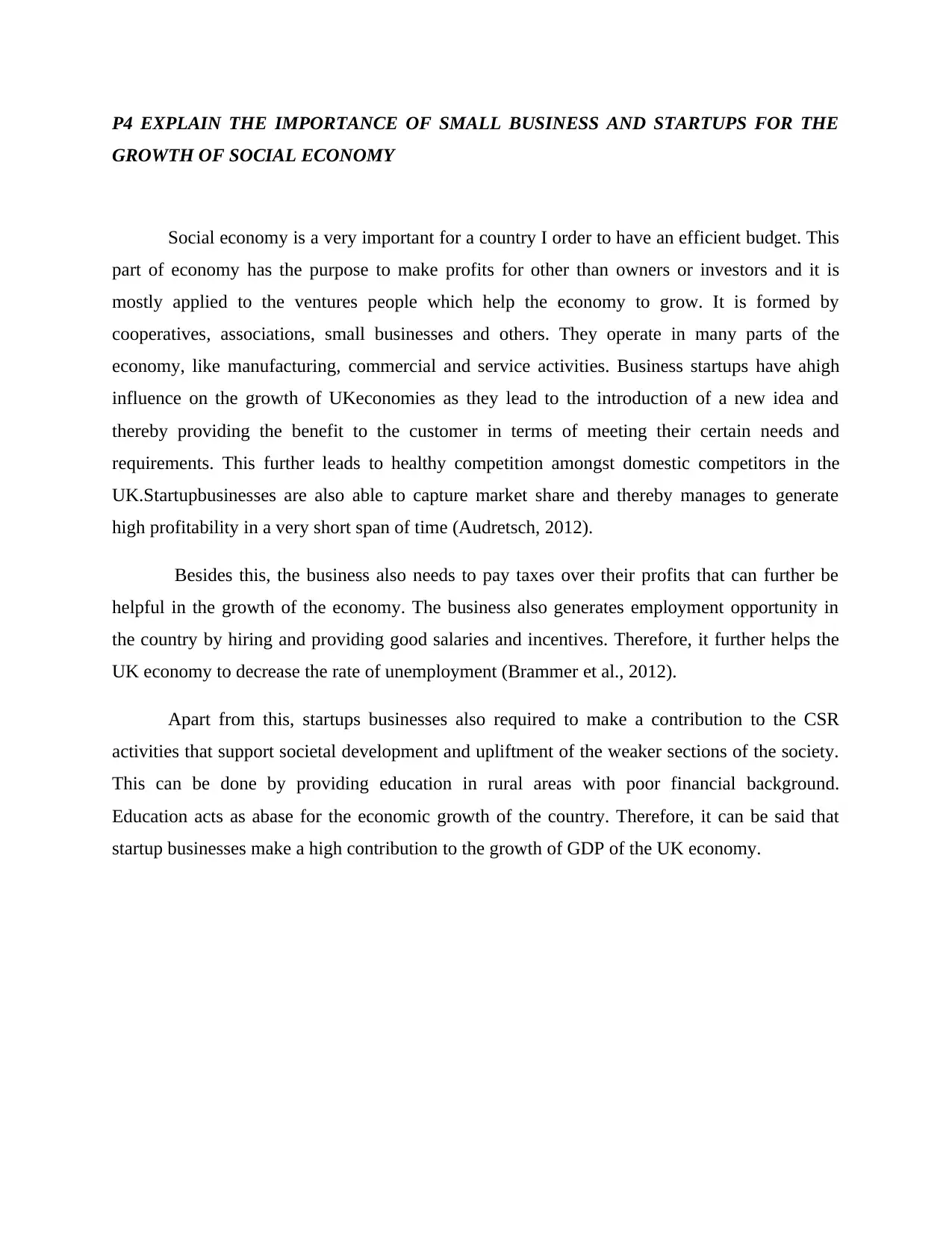
P4 EXPLAIN THE IMPORTANCE OF SMALL BUSINESS AND STARTUPS FOR THE
GROWTH OF SOCIAL ECONOMY
Social economy is a very important for a country I order to have an efficient budget. This
part of economy has the purpose to make profits for other than owners or investors and it is
mostly applied to the ventures people which help the economy to grow. It is formed by
cooperatives, associations, small businesses and others. They operate in many parts of the
economy, like manufacturing, commercial and service activities. Business startups have ahigh
influence on the growth of UKeconomies as they lead to the introduction of a new idea and
thereby providing the benefit to the customer in terms of meeting their certain needs and
requirements. This further leads to healthy competition amongst domestic competitors in the
UK.Startupbusinesses are also able to capture market share and thereby manages to generate
high profitability in a very short span of time (Audretsch, 2012).
Besides this, the business also needs to pay taxes over their profits that can further be
helpful in the growth of the economy. The business also generates employment opportunity in
the country by hiring and providing good salaries and incentives. Therefore, it further helps the
UK economy to decrease the rate of unemployment (Brammer et al., 2012).
Apart from this, startups businesses also required to make a contribution to the CSR
activities that support societal development and upliftment of the weaker sections of the society.
This can be done by providing education in rural areas with poor financial background.
Education acts as abase for the economic growth of the country. Therefore, it can be said that
startup businesses make a high contribution to the growth of GDP of the UK economy.
GROWTH OF SOCIAL ECONOMY
Social economy is a very important for a country I order to have an efficient budget. This
part of economy has the purpose to make profits for other than owners or investors and it is
mostly applied to the ventures people which help the economy to grow. It is formed by
cooperatives, associations, small businesses and others. They operate in many parts of the
economy, like manufacturing, commercial and service activities. Business startups have ahigh
influence on the growth of UKeconomies as they lead to the introduction of a new idea and
thereby providing the benefit to the customer in terms of meeting their certain needs and
requirements. This further leads to healthy competition amongst domestic competitors in the
UK.Startupbusinesses are also able to capture market share and thereby manages to generate
high profitability in a very short span of time (Audretsch, 2012).
Besides this, the business also needs to pay taxes over their profits that can further be
helpful in the growth of the economy. The business also generates employment opportunity in
the country by hiring and providing good salaries and incentives. Therefore, it further helps the
UK economy to decrease the rate of unemployment (Brammer et al., 2012).
Apart from this, startups businesses also required to make a contribution to the CSR
activities that support societal development and upliftment of the weaker sections of the society.
This can be done by providing education in rural areas with poor financial background.
Education acts as abase for the economic growth of the country. Therefore, it can be said that
startup businesses make a high contribution to the growth of GDP of the UK economy.
⊘ This is a preview!⊘
Do you want full access?
Subscribe today to unlock all pages.

Trusted by 1+ million students worldwide
1 out of 26
Related Documents
Your All-in-One AI-Powered Toolkit for Academic Success.
+13062052269
info@desklib.com
Available 24*7 on WhatsApp / Email
![[object Object]](/_next/static/media/star-bottom.7253800d.svg)
Unlock your academic potential
Copyright © 2020–2025 A2Z Services. All Rights Reserved. Developed and managed by ZUCOL.





